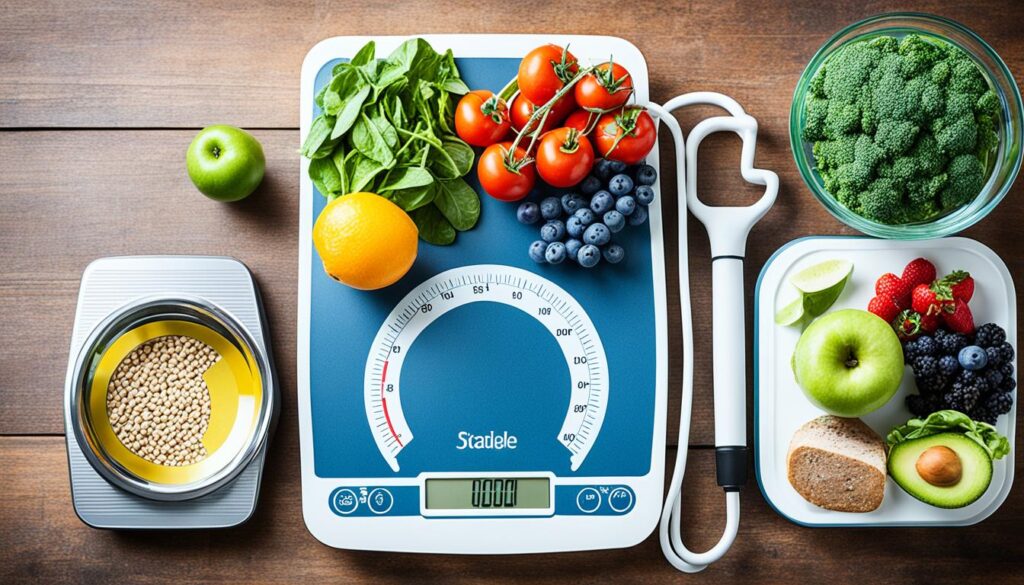Did you know that a BMI under 18.5 means you’re underweight and at risk for health problems? This fact shows how crucial balanced nutrition is. Even if you work out a lot or follow trendy diets, ask yourself: Are you really eating well?
It’s key to know what a healthy diet looks like, with all the diet advice out there. Poor nutrition can show in simple ways, like feeling tired all the time or being moody. Other signs include unexpected weight changes or hair loss from not getting enough nutrients. Let’s look at some signs that show if you’re eating right.
Key Takeaways
- A BMI under 18.5 indicates an increased risk for health issues due to being underweight.
- At least 1,000 calories per day are needed for basic bodily functions.
- Restricting calories can lead to increased appetite, food cravings, and even hinder weight loss efforts.
- Physical signs like hair loss can indicate nutrient deficiencies, showing the need for a balanced diet.
- Consultations with a dietitian are beneficial and sometimes covered by insurance plans.
You Have Sufficient Energy Throughout the Day
One way to know if you are eating healthy is by checking your daily energy. Your body’s energy comes from what you eat. Eating a balanced diet for sustained energy keeps you energized all day long.
Understanding Energy Levels
Your energy levels depend on many things. Most of your daily energy, about 70%, is for your basic body functions when you’re resting. Another 10% is from digesting and absorbing food. The last 20% is from physical activity.
Healthy eating helps keep your energy balanced:
- Eat a mix of carbs for quick energy, proteins for muscle repair, and fats for staying full.
- Get enough fiber to keep your blood sugar stable and avoid energy drops.
- Have regular meals and snacks to keep your energy steady.
Healthy Eating Indicators for Sustained Energy
Eating a balanced diet for sustained energy is key. Here are signs you’re eating well:
- Caloric Intake: Women usually eat about 1,803 calories a day, says the NHANES survey. For a sedentary life, you need 10 calories per pound of body weight daily. For more activity, you need more calories.
- Dietary Fiber: Eating a lot of fiber can lower heart disease risk by 9% for every 7 grams you eat daily. It also keeps your blood sugar stable, helping you stay energized.
- Meal Composition: Your meals should have slow-digesting proteins, steady carbs, and healthy fats. This mix keeps your energy up all day.
Here’s a look at how much energy you burn and what you need to eat:
| Daily Energy Expenditure Percentages | Caloric Needs per Activity Level (Calories per Pound) |
|---|---|
| Basal Metabolic Rate: 70% | Sedentary: 10 |
| Thermic Effect of Food: 10% | Mildly Active: 13 |
| Physical Activity: 20% | Moderately Active: 15 |
| Highly Active: 18 |
By using these healthy eating indicators, you can eat a balanced diet that keeps you energized all day.
Your Hunger and Satiety Signals Are Consistent
Consistent hunger and satiety signals show you’re eating well. It’s key to know when you’re hungry and what you eat. This helps keep your diet balanced.
Recognizing Physical Hunger vs. Emotional Eating
It’s vital to know the difference between physical and emotional hunger. Physical hunger signals include stomach noises, feeling light-headed, or trouble focusing. Eating when you’re hungry but not starving helps you eat better.
This mindful eating is crucial for a good diet. It helps you understand when you’re truly hungry.
- Physical hunger often starts with mild stomach sensations.
- Emotional eating is triggered by feelings rather than physical needs.
- Recognizing poor eating habits involves differentiating these cues effectively.
Importance of Intuitive Eating
Intuitive eating means eating when you’re hungry and stopping when you’re full. It’s about listening to your body, not following strict diets. This approach helps you avoid eating too much and builds a healthier food relationship.
The Mindful Eating Cycle has six steps: Why do I eat? When do I want to eat? What do I eat? How do I eat? How much do I eat? Where do I invest my energy? Following this cycle improves your diet quality and helps you listen to your body.
“Mindful eating is a way to rediscover the best of ourselves through the act of eating.” – Jan Chozen Bays
- Eating should begin at a moderate hunger level to avoid overeating.
- A well-regulated appetite can be identified by recognizing satiety signals such as stomach fullness and contentment.
- Embracing intuitive eating helps in managing caloric intake in alignment with physical needs.
Understanding hunger cues and eating intuitively helps you manage your eating better. It also improves your relationship with food.
Your Diet Includes a Variety of Foods
One key sign of a balanced diet is eating a wide range of foods. This mix makes sure you get all the nutrients your body needs. Thinking about your food choices helps you achieve this balance.

Balanced Meals: Carbohydrates, Proteins, and Fats
It’s important to have balanced meals to meet your nutrient needs. Carbohydrates, proteins, and fats are key. They affect your energy and health.
- Carbohydrates: They give you energy. Good sources are whole grains, veggies, and fruits.
- Proteins: They help repair and maintain your body. Go for lean proteins like fish, poultry, and beans.
- Fats: They’re good for your brain and help with nutrient absorption. Choose healthy fats in nuts, seeds, and avocados.
Wide Range of Nutrient-Dense Foods
For healthy eating, eat a variety of nutrient-dense foods. These foods are packed with vitamins, minerals, and more without too many calories.
| Food Group | Examples |
|---|---|
| Fruits and Vegetables | Apples, berries, spinach, broccoli |
| Whole Grains | Quinoa, oats, brown rice |
| Lean Proteins | Chicken breast, lentils, tofu |
| Dairy | Low-fat yogurt, milk, cheese |
The Role of Phytochemicals and Micronutrients
Phytochemicals and micronutrients are key for health and disease prevention. Phytochemicals in plants protect cells from damage. Micronutrients like vitamins and minerals support your immune system and energy levels.
- Eat colorful veggies and fruits to get more phytochemicals.
- Choose a variety of foods to meet your daily needs for iron, calcium, and vitamin D.
This shows why a varied diet is crucial. It helps you eat well and stay healthy.
Are You Eating Well Enough? Check These Signs
To know if you’re eating well, it’s key to clear up some wrong ideas. Many think healthy eating means always being hungry or skipping certain foods. But, that’s not true. Instead, look at what you eat to make sure you’re getting enough fuel and nutrients.
Common Misconceptions About Healthy Eating
There are many wrong ideas about eating right. One is thinking you should always be hungry. But, a good diet should keep you full and give you energy, not make you feel deprived. Signs you might not be eating well include feeling very hungry or having low energy, showing you might be missing some nutrients.
Another wrong idea is cutting out whole food groups. For example, skipping starchy foods can leave you lacking energy. Starchy foods should be about a third of what you eat daily. Eating a variety of foods helps you get all the nutrients you need for good health.
Balanced Diet vs. Restrictive Diets
There’s a big difference between eating well and eating less. Restrictive diets often lead to binge eating or not getting enough nutrients. Balanced diets, on the other hand, are good for your health in the long run. They include all food groups in the right amounts.
The Eatwell Guide says fruits and veggies should be over a third of what you eat, aiming for five portions a day. Dairy products like milk and cheese are great for protein and calcium, which are important for staying healthy.
“Balanced diets provide lasting benefits compared to restrictive diets which can be harmful. Evaluating your food choices wisely can avoid common pitfalls.”
Instead of focusing on what to avoid, think about what to add to your diet. Adding unsaturated fats, lean meats, and fish can be good starts. Understanding the truth about diets can help you have more energy, a better mood, and overall better health.
You Enjoy Your Meals and Snacks
Feeling happy with your food is a key sign you’re feeding your body right. Enjoying your meals and snacks helps you build a good relationship with food.  Tasting different flavors and textures makes eating a positive experience.
Tasting different flavors and textures makes eating a positive experience.
Eating a mix of foods every day means you’re enjoying balanced meals. Eating smaller meals often helps keep muscles lean and stops unhealthy snacking. This keeps your metabolism steady and prevents overeating after long waits.
It’s important to have good food experiences to manage hunger and fullness. Eating with focus and enjoying your food helps you understand your body’s needs better. Eating foods high in fiber, like fruits, veggies, and whole grains, aids digestion and prevents constipation.
Here’s a look at key nutrients and their effects:
| Nutrient | Impact on the Body |
|---|---|
| Carbohydrates | Increase serotonin levels in the brain, calming effect |
| Protein | Promote alertness |
| Healthy Fats | Essential for brain cell membranes and function |
Eating a diet rich in these nutrients leads to more positive food experiences. It improves both your mental and physical health. By enjoying your food and focusing on balanced meals, you can maintain a healthy diet every day.
Your Sleep Quality Is Good
Quality sleep is closely tied to what we eat. In the U.S., about one-third of adults don’t get enough sleep. It’s important to know how diet affects sleep to get better rest.
Link Between Diet and Sleep
Eating foods low in fiber, high in saturated fat, or lots of sugar can make sleep less restful. But, eating foods rich in nutrients for sleep can help a lot. Drinking caffeine or alcohol close to bedtime can also disrupt sleep, making it hard to get deep sleep.
Not eating enough fat, carbs, or protein can also hurt sleep quality. Eating regularly helps improve sleep by keeping sleep patterns steady and supporting natural body rhythms.
Nutrients that Aid Sleep
- Magnesium in leafy greens, nuts, and seeds helps you relax and sleep faster.
- Omega-3 fatty acids in oily fish like salmon support brain function and reduce inflammation, helping sleep.
- Certain foods like cherries, kiwi fruit, poultry, and eggs boost sleep quality with tryptophan and melatonin.
- Simple carbs eaten a few hours before bed help you fall asleep faster. But, avoid high-sugar and high-carb diets as they can worsen sleep.
Poor food choices can mess with your sleep. High-calorie or high-fat diets can make it tough to fall and stay asleep. On the other hand, a balanced diet with key nutrients supports a good night’s sleep and a healthy sleep cycle. It’s not just about what you eat, but also when you eat; eating too close to bedtime can hurt your sleep quality.
Your Mood Is Stable
Feeling stable in your mood often shows you’re eating well and keeping nutritional balance. Learning how food affects your mood can help you feel better overall.
Impact of Nutritional Balance on Mood
Being in good nutritional balance helps keep your mood steady. When you’re stressed or depressed, you might eat too much or too little, which can make you feel worse. Studies show that the good bacteria in your gut make a lot of serotonin, which helps keep your mood stable. Eating a variety of foods helps your brain work right, making you feel better emotionally.

- Gut health: The gut-brain connection is crucial for emotional wellbeing. A diet rich in probiotics from yogurt and fermented foods can support this balance.
- Healthy fats: Olive oil, coconut oil, and avocados contain fats essential for brain function, leading to mood support.
- Omega-3 fatty acids: Found in fish like salmon, these are crucial for brain health and emotional stability.
Signs of Mood Stabilized by Proper Diet
Eating a variety of foods can make you feel better. Eating lots of fruits, veggies, lean meats, and whole grains helps your mood. This kind of diet is good for your emotional health.
- Balanced meals: Eating a mix of foods at meals and snacks helps keep your blood sugar steady, which keeps your mood stable.
- Food journaling: Writing down what you eat can show you how certain foods affect your mood. This helps you find and avoid foods that make you feel bad.
- Consistent eating habits: Eating regularly and eating well helps your brain work right, making you feel more stable.
| Nutrient | Role in Mood Stability | Example Foods |
|---|---|---|
| Healthy Fats | Support Brain Function | Olive Oil, Avocados |
| Omega-3 Fatty Acids | Promote Brain Health | Salmon, Flaxseeds |
| Probiotics | Maintain Gut Health | Yogurt, Fermented Foods |
| Fruits and Vegetables | Provide Necessary Nutrients | Spinach, Berries |
Getting better emotionally through food means eating well and paying attention to how food affects you. Eating right can really help you feel more stable and happy.
Your Weight Is Stable
Keeping a steady weight shows your diet matches your body’s energy needs. Normal weight changes happen, but big swings might mean diet or lifestyle issues. Knowing these changes helps keep a healthy weight and balanced nutrition.
Understanding Weight Fluctuations
Weight changes can happen due to water retention, hormonal cycles, or the time you weigh yourself. But big, frequent changes could mean there’s a problem. For older adults, being overweight can lead to heart disease and diabetes. Being underweight can cause osteoporosis and anemia.

| Condition | Health Risks |
|---|---|
| Overweight (High BMI) | Heart Disease, High Blood Pressure, Stroke, Diabetes |
| Underweight | Osteoporosis, Anemia |
Role of Diet in Maintaining a Healthy Weight
Eating a balanced diet is key to managing weight. It gives you the energy you need without overeating. Aim for 150 minutes of exercise a week to help control your weight. Eating regular, nutrient-rich meals supports long-term weight management.
After getting over illnesses like COVID-19, adjusting your diet is important. Changes in appetite and taste can make eating hard. But eating small, frequent meals with lots of protein and calories helps with recovery and keeps weight stable.
Conclusion
Looking at your eating habits is key to understanding your health and wellness. Signs like steady energy, good mood, and enjoying meals show if your diet meets your needs. Remember, it’s not just about counting calories or following strict diets. Aim for a diet full of different nutrients.
Heart disease is the top cause of death in the U.S., affecting nearly half of all adults. Many heart problems, like high blood pressure, can be lowered with better food choices. The DASH diet is a good example. It suggests eating less sodium and more potassium, magnesium, and calcium for a healthy heart.
The American Heart Association also highlights fiber’s role in lowering cholesterol and cutting heart disease risk. A diet high in fiber is good for your gut and helps keep your blood sugar stable, which is key for diabetes control. By reviewing your diet, you can make choices that boost your health and happiness. A diet full of nutrients is the path to lasting health and energy.
FAQ
What are some signs of poor nutrition?
How can I know if I am eating healthy?
What are the warning signs of nutritional deficiency?
What are healthy eating indicators for sustained energy?
How can I differentiate between physical hunger and emotional eating?
What does intuitive eating mean?
What constitutes a balanced meal?
Why is variety important in a healthy diet?
What are some common misconceptions about healthy eating?
How does enjoying meals and snacks contribute to health?
What is the link between diet and sleep quality?
How can diet stabilize mood?
What role does diet play in maintaining a healthy weight?
Source Links
- https://www.piedmont.org/living-real-change/12-signs-you-may-not-be-eating-enough – 12 signs you may not be eating enough
- https://www.gundersenhealth.org/health-wellness/eat-move/how-to-know-if-youre-really-eating-healthy – How to know if you’re really eating healthy
- https://www.eatingwell.com/article/7676567/7-signs-you-might-not-be-eating-enough-calories/ – 7 Signs You Might Not Be Eating Enough Calories
- https://www.eatingwell.com/article/7907005/sneaky-signs-youre-not-eating-enough-fiber-according-to-a-dietitian/ – 6 Sneaky Signs You’re Not Eating Enough Fiber, According to a Dietitian
- https://www.eatingdisorderhope.com/nutrition-counseling-eating-disorders/physical-cues-hunger-satiety – What are the Physical Cues of Hunger and Satiety?
- https://www.alittlenutrition.com/understanding-your-hunger-cues-and-intuitive-eating/ – Understanding Your Hunger Cues and Intuitive Eating
- https://extension.usu.edu/nutrition/research/learning-listening-hunger-fullness-cues – Learning to Listen to Hunger and Fullness Cues
- https://www.healthline.com/health/balanced-diet – Balanced Diet: What Is It and How to Achieve It
- https://www.heartandstroke.ca/healthy-living/healthy-eating/healthy-eating-basics – Healthy eating basics
- https://www.nhs.uk/live-well/eat-well/food-guidelines-and-food-labels/the-eatwell-guide/ – The Eatwell Guide
- https://bepure.co.nz/blog/signs-youre-eating-right-for-you/ – 6 Signs You’re Eating Right For You
- https://www.healthlinkbc.ca/health-topics/healthy-eating-recognizing-your-hunger-signals – Healthy Eating: Recognizing Your Hunger Signals
- https://www.ymcamidtn.org/health-and-fitness/articles/5-signs-youre-not-eating-well – 5 Signs You’re Not Eating Well
- https://chriskresser.com/are-you-an-under-eater-8-signs-youre-not-eating-enough/ – Not Eating Enough? Here are 8 Signs and Symptoms and How to Improve | Chris Kresser
- https://www.sleepfoundation.org/nutrition – Nutrition and Sleep: Diet’s Effect on Sleep
- https://www.sleepfoundation.org/physical-health/diet-exercise-sleep – The Connection Between Diet, Exercise, and Sleep
- https://www.sutterhealth.org/health/nutrition/eating-well-for-mental-health – Eating Well for Mental Health
- https://healthy.kaiserpermanente.org/health-wellness/healtharticle.improve-your-mood-with-healthy-food – Improve your mood with healthy food
- https://www.nia.nih.gov/health/healthy-eating-nutrition-and-diet/maintaining-healthy-weight – Maintaining a Healthy Weight
- https://www2.hse.ie/conditions/covid19/recovery/eating-well/ – Eating well while recovering from COVID-19
- https://nutritionstripped.com/body-signs-not-eating-enough/ – 8 Signs Your Body Says You’re Not Eating Enough
- https://www.medicalnewstoday.com/articles/322268 – Benefits of eating healthy: Heart health, better mood, and more
- https://www.thehealthy.com/nutrition/signs-of-healthy-diet-dietitian/ – 7 Signs You Have a Healthy Diet, Says a Dietitian

